
Rabbits at Ingleside Animal Hospital
Rabbits are intelligent, often friendly, and quiet house pets. They come in variety of sizes, colors, and personalities. Their average lifespan (depending on breed and size) can range from 7 to 10 years.

- Rabbits are slightly timid, but are social through time
In the wild, rabbits are a prey species. They are very aware of their surroundings and are always on the alert for predators or any change to their environment. Because of this, the transition to a new home may be scary for your rabbit at first.
For the first three or four days, give the rabbit a chance to get used to their new surroundings. Set up its cage in a quiet, low-traffic area. Talk quietly to the rabbit and pet him or her gently, but refrain from picking it up. When your rabbit comes to you for attention, you will know it is becoming comfortable and you can begin picking it up and allowing it playtime outside the cage.
-
Rabbits are sensitive to temperature
Because rabbits are susceptible to heatstroke, environmental temperatures should be kept between 60 to 70° F and high humidity should be avoided. Keep your rabbits' enclosure in a quiet, dry, well-ventilated area.
-
They use litter boxes!
Rabbits are easily trainable to use litter boxes (one they can fully sit in). This makes cleaning the rabbits cage much easier, and less frequently. There should be at least one litter box per rabbit, in colonies of 3+ there should be three litter boxes plus one in a separate area. Appropriate litter material includes shredded newspaper and recycled paper pellets.
- They require a balanced diet.
A healthy rabbit’s diet includes:
- Hay
- Green foods
- Pellets
- Treats (non-leafy vegetables and fruit)
- Supplements and vitamins (if required)
- Water
-
Rabbits require exercise
Rabbits are most active in the morning and evening and sleep during the day and night. Rabbits need at minimum 3-5 hours of exercise daily outside the cage. They are naturally curious and enjoy opportunities to explore. Start off with a small area of your house, allowing only as much freedom as they can handle. To prevent destruction to your house and protect the rabbit from harm, don't allow access to electrical cords, houseplants, furniture, any woodwork, carpeting, and other items irresistible to chewing.
Toys can provide stimulation for a caged rabbit. Offer new toys and rotate toys monthly. Suggested toys include toilet paper tubes, large cardboard tubes they can run through, plastic whiffle balls, and hard plastic cat toys (especially if they rattle). Rabbits also love to dig and burrow, so try stuffing a cardboard box with hay or paper for your rabbit to explore.
-
They require the same amount of medical care as a dog or cat
All pets, including rabbits, need regular examinations. Rabbits can occasionally get sick and their illnesses can be severe. They should be examined annually and have their feces tested for parasites during the annual visit.
All newly adopted rabbits should be examined by a qualified veterinarian within two weeks of adoption. Many problems are caused by misinformation, and the first veterinary visit can help prevent well-intentioned owners from making mistakes.
Spaying or neutering your rabbit is highly recommended. This helps prevent uterine cancer in females and aggressive behavior in males.
If kept in clean surroundings and fed a good diet, rabbits rarely fall ill. However, rabbits are prey animals and usually once they begin showing signs of sickness, they are very ill. Even the most subtle change, like not wanting to eat their favorite treat, could be an early sign of disease. You should seek prompt medical attention for a rabbit showing signs of illness such:
- Lethargy
- Lack of appetite or drinking
- Lack of stools, change in shape
- Diarrhea
- Sneezing
- Nasal, eye, or ear discharge
- Head tilt
- Urinary incontinence, red urine, inability to urinate
- Marked change in behavior
- Fur loss, scratching
Signs of disease can be vague and non-specific, and any deviation from normal should be a cause for concern and requires immediate evaluation by your veterinarian.
If you need to make an appointment for your rabbit, contact us today!
FAQ
Do rabbits make good pets?
Yes, rabbits can make wonderful companions. They are social, intelligent, and full of personality. However, they require gentle handling and regular interaction to build trust and prevent behavioral issues. The more time you spend bonding with your rabbit, the more affectionate and well-adjusted they will become.
Do I need to groom my rabbit?
Yes, grooming is an important part of rabbit care. Dr. Serbin recommends brushing your rabbit regularly to reduce shedding and prevent fur blockages, especially for long-haired breeds. You should also keep their nails trimmed to avoid overgrowth or injury. Regular grooming helps keep your rabbit healthy and comfortable.
For more than five decades, families from greater Phoenix, Arcadia, Paradise Valley, Tempe, and Scottsdale in Arizona have come to rely on our trustworthy and compassionate care. As an AAHA-accredited, Fear Free, and Cat Friendly facility, your pet’s well-being and comfort are our highest priorities.
